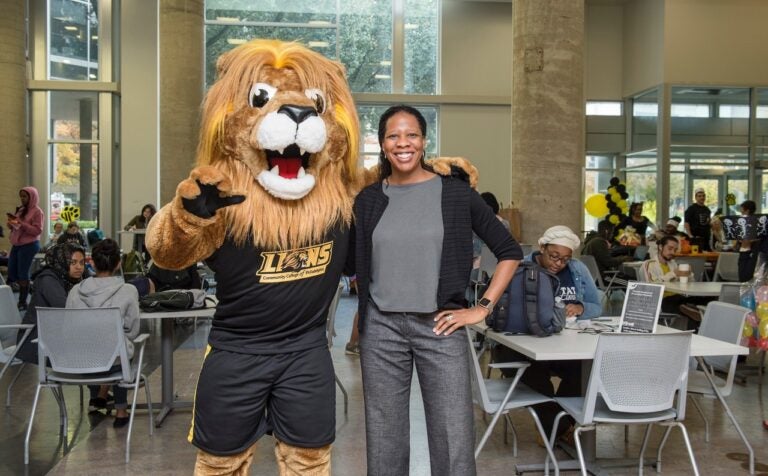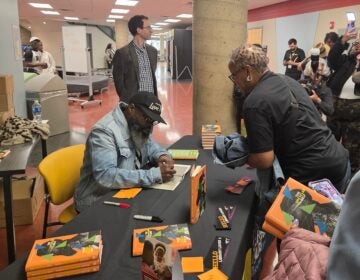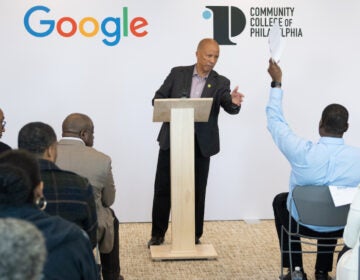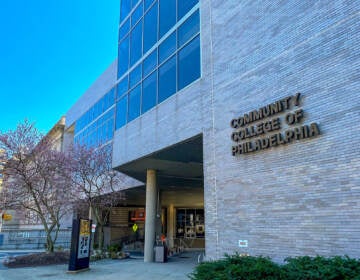Community College of Philadelphia dean discusses decision to move classes fully online
Community College of Philadelphia Dean of Liberal Studies Chae Sweet discusses moving classes fully online for the upcoming school year.
Listen 5:56
Chae Sweet, Dean of Liberal Studies at the Community College of Philadelphia, poses with mascot Roary the lion pre-pandemic when in-class learning was still the norm. (Elizabeth Field/CCP)
At the end of May, Community College of Philadelphia blazed a trail when its leadership made an early decision to offer all online learning this fall.
Over the summer months, CCP’s Dean of Liberal Studies Chae Sweet helped 200 teachers in her department plan and prepare for this new framework.
Morning Edition host Jennifer Lynn spoke with Dean Sweet about how things are coming along. She says teamwork has been the key to taking on this technical endeavor.
___
So they were faculty experts, right? And there were some who had never done it, [and] those who had done it many, many times. And we brought them all together and we let the faculty decide what the training needed to be and then to do it. And that made all the difference because they were talking to each other, right? And so using that technology was one of the biggest leaps that many had to make. But then they also wanted to know, “How can I translate my passion for students in teaching to this online environment if I can’t see them?” And that was the same question that students had. “How can I get that same community experience if we’re online?”
A lot of instruction is on Zoom for regular academic classes and it’s being used for creative arts classes in your department — for instance, studio sessions for budding photographers and drawing courses. How is that accomplished?
So one of the things that Zoom offered us was a way to be online but still synchronous, which means that the students are online with the faculty live on Zoom. They could emulate some of those in-person experiences with equipment and studios and painting. So, for example, the instructor could be watching someone as they start to draw right at their home. It’s not easy, but using some of the software that’s available and longer synchronous sessions, they were able to create that kind of environment in the online modality.
And about 20% of classes will be synchronous sessions. What was one of the bigger concerns that the teachers had as they began to define their online courses?
Honestly, the technology and just being able to use it capably. It felt to them as if it were a barrier between them and the students, and they didn’t know how they would be able to overcome that, given that you also relied on the Internet. And you also are in your home environment, which has whatever is going on there as part of the background. But one of the things that really helped them was that they knew they didn’t have to worry about their health and even that of their students. And a lot of people had childcare issues, both the students and the faculty. And that’s, again, something they didn’t have to negotiate to be present in the class. I think lifting that worry from them eased a lot of the worries that they had about the technology.
CCP usually does offer childcare for students, doesn’t it?
Yes. So when the college opens, the childcare center generally opens.
You have been an educator for a while. What piece of this puzzle was most fascinating to you?
One of the things that we did was we have sections of courses where there are, say, 100 versions of the same course running. Rather than have 100 faculty create those courses, we had some expert faculty design a model course, so it gave them a baseline that had all the elements that they needed, and they just needed to understand how to bring their own work into it. And to deliver it to their students rather than for everybody to reinvent the wheel time and time again.
Does the program offer any support services to teachers or students who may not have very good Internet, or their computers are lacking? Is there any way to make sure everyone is literally up to speed?
Yes, we have a laptop loaner program. We also use support from the CARES Act to purchase a lot of technology for both staff, faculty and students, including the laptops. But for those specialized programs as well, we had to buy a lot of additional equipment to make the online environment possible. We’re looking at how to have Wi-Fi spots around the campus. And even some access to the campus for computer labs and things like that for students who do not have any access at home.
What will become of the facilities themselves this semester?
So we do have some on-campus activities, and we even have some in-person classes. But they’re very select. And so one of those areas where we really needed to bring students back on campus were in some of the allied health areas.
How about students with special needs? Can they be included?
We are very aware of the ADA compliance issues that we want to make sure we address. Any of the software that we use has to be adaptable, even in thinking of those who come on campus. We had to make sure the PPE that we supplied was appropriate for different populations.
Are you concerned that students won’t show up for an online class, or do you think you might have more people showing up for class? Is there more pressure to be eye-to-eye on the computer?
I thought that students would be happy to be unfettered from time and place with the online environment. But our surveys of students in the spring and in the summer, consistently what they said was, “We want to see our faculty.” We want the synchronous sessions. We want the one-on-one or chat discussions that are live because they were really valuing that interaction. Email wasn’t enough. Students are recognizing that everyone is grappling with this. And we have to look at what the new normal is.
WHYY is your source for fact-based, in-depth journalism and information. As a nonprofit organization, we rely on financial support from readers like you. Please give today.




![CoronavirusPandemic_1024x512[1]](https://whyy.org/wp-content/uploads/2020/03/CoronavirusPandemic_1024x5121-300x150.jpg)


